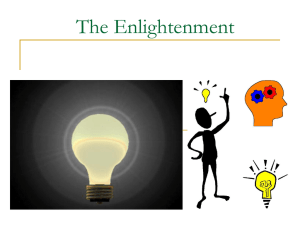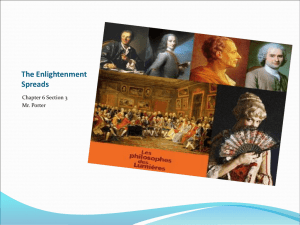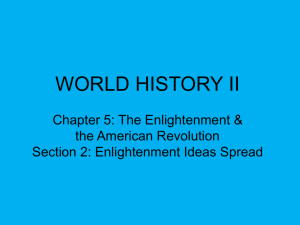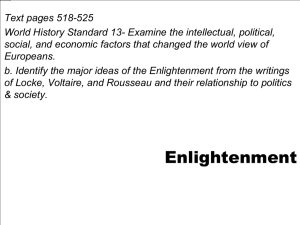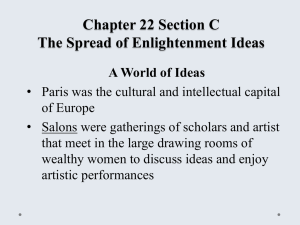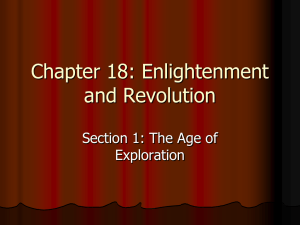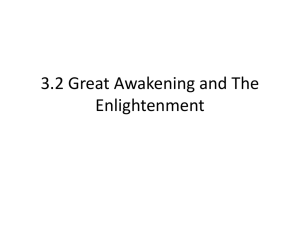Intro to the Enlightenment
advertisement
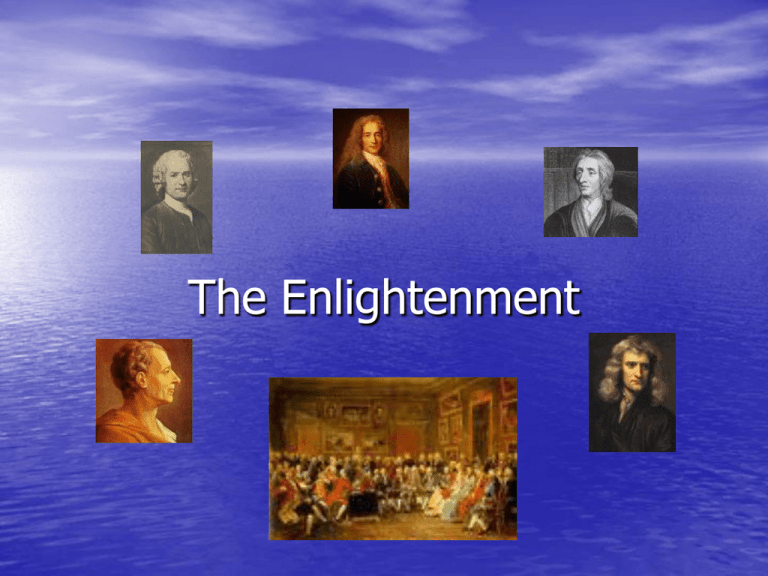
The Enlightenment Important terms • Absolutism: A system of government in which a • monarch is the only source of power Common good: An effort by individuals to work together for the benefit of all • Natural rights: A belief that individuals are naturally endowed with basic human rights that cannot be taken away or given up Path to the Enlightenment • Forefathers of the Enlightenment: – John Locke: wrote Essay Concerning Human Understanding • Stated that every person was born with a tabula rasa, or blank slate • People are molded by the experiences in the world, and so if people change society can change as well Hobbes v. Locke • In this corner: John Locke: Believing that people • have natural rights and that before society was organized people lived in a state of equality and freedom And in this corner: Thomas Hobbes: Believing that people entered into a social contract and agreed to form a state; this state would then be governed by an absolute ruler in order to keep peace and preserve order Sir Isaac Newton • The physical world and everything in it was like a giant machine • Enlightenment thinkers would use Newton’s methods to discover the natural laws that govern human society What was the Enlightenment? • A historical period in the 18th century in which science and reason was applied to question traditional thinking about the world; provided new thinking about government and people’s rights The Spread of the Enlightenment • Lower class and peasants unaffected by Enlightenment. Why? – Most Enlightenment ideas spread through the growth of reading • Elite in society= literate • Growing number of middle class also becoming literate at this time= spread of Enlightenment ideas among middle class – Development of magazines and newspapers • Helped to spread Enlightenment ideas to a mass audience • First daily newspaper published in London in 1702 Salons • Salon: elegant drawing rooms of the wealthy upper class – Invited guests would gather in salons and discuss topics that centered around the new ideas of the philosophes – Women who host these salons are given a degree of political and social influence • Salon discussions are used to sway political opinion and social tastes Who led the Enlightenment? • The philosophes: the Enlightenment thinkers – Writers, professors, journalists, economists, and social reformers – Mostly noble/middle class – The role of philosophy is to change the world – The philosophes often disagreed Influential Philosophes Baron de Montesquieu • French nobility • The Spirit of Laws: study of governments – Tried to use the scientific method to find the natural laws that govern the social and political relationships of human beings – Three kinds of governments: • Republics= small states • Despotism= large states • Monarchies= moderate states – • Three forms of government • The executive (monarch) • The legislative (parliament) • The judicial (courts) – Government functions through a separation of powers/ checks and balances Voltaire • Prosperous middle class family in Paris • Religion: Criticized Christianity and believed strongly that all religions should be tolerant of one another – “All men are brothers under God.” – Treatise on Toleration, 1763 • Deism – – – – Foundation= Newtonian world-machine Mechanic of the universe= God (clockmaker) Universe= a clock What happens after God sets the clock? What is his God’s role then? Jean Jacques Rousseau • Part of the later Enlightenment • Discourse on the Origins of the Inequality of Mankind: people are enslaved to their governments • The Social Contract: – Most famous work – Social contract: society agrees to be governed by its general will • Individuals cannot follow their own self- interests Women and the Enlightenment • Mary Wollstonecraft: founder of the modern European and American Women’s rights movements and a daughter of the Enlightenment – Vindication of the Rights of Women: argues that many Enlightenment thinkers are hypocrites when it comes to the role of women in society The Enlightenment and Religion • John Wesley: An Anglican minister who founded a new religious movement called Methodism – Focused on preaching to all people, and not just the upper and middle classes – Preached in open fields – Methodist societies were formed in which everyone helped each other to do good works and gave those involved a sense of purpose and community – Stressed the importance of hard work and spiritual contentment versus political equality – Religion was not overshadowed by the search for reason during the Enlightenment as proven by the formation of Methodism


